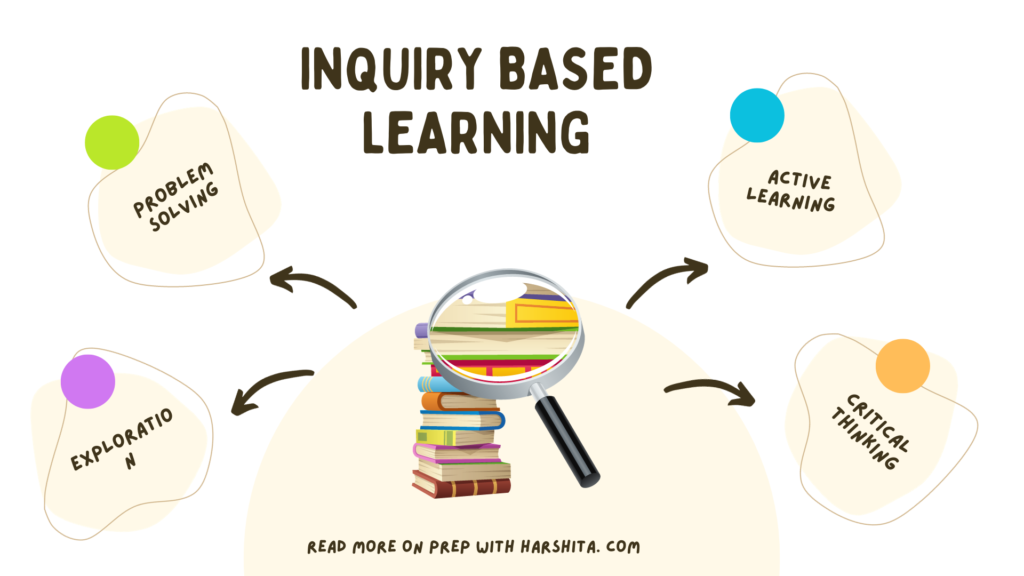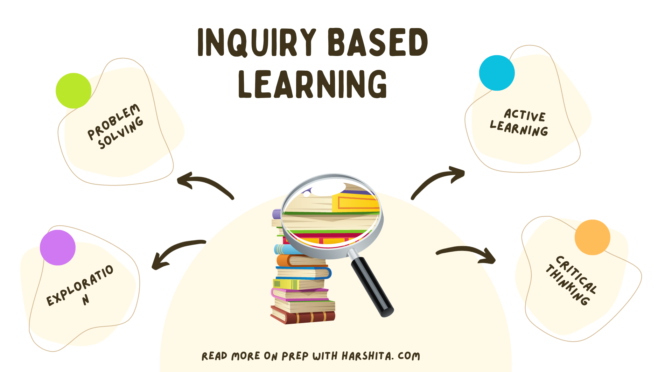Inquiry Learning Model is a student-centered, active learning approach that places students at the center of the learning process.
Instead of traditional lecture-style teaching, where information is delivered to students passively, inquiry learning encourages students to ask questions, explore topics, and actively engage in problem-solving and critical thinking.
Here are the key elements and principles of an inquiry learning model:
- Questioning: Students are encouraged to ask questions and express their curiosity about a particular topic. These questions can be open-ended and drive the direction of their learning.
- Exploration: Students engage in hands-on activities, research, and investigations to gather information and data related to their questions. This may involve experiments, surveys, reading, or other forms of data collection.
- Critical Thinking: Through inquiry, students develop critical thinking skills by analyzing information, evaluating evidence, and making informed decisions or drawing conclusions based on their findings.
- Problem-Solving: Inquiry learning often presents students with real-world problems or challenges that require creative problem-solving. Students work independently or collaboratively to develop solutions.
- Active Participation: Students actively participate in their learning process. They are responsible for setting goals, planning their activities, and monitoring their progress.
- Teacher Facilitation: While students take a more active role in inquiry learning, teachers play a crucial role as facilitators. They guide students, provide resources, offer support, and help frame questions and problems.
- Reflection: Students are encouraged to reflect on their learning experiences. This reflection helps them consolidate their knowledge and develop metacognitive skills, allowing them to become more effective learners.
- Interdisciplinary Approach: Inquiry learning often blurs the boundaries between subjects. It allows students to explore topics from various angles, incorporating elements from multiple disciplines.
- Student Autonomy: Students have a degree of autonomy in choosing the topics they want to explore and the methods they want to use for investigation. This autonomy fosters a sense of ownership over their learning.
- Assessment: Assessment in inquiry learning focuses on the process as well as the product. It may involve self-assessment, peer assessment, and teacher evaluation of the skills and knowledge gained through the inquiry process.
- Continuous Learning: Inquiry learning promotes a culture of continuous learning. Students learn how to learn, develop a growth mindset, and become more self-directed in their pursuit of knowledge.
Inquiry Learning Model can be applied at various educational levels, from primary school through higher education. It encourages students to become active, engaged, and curious learners while developing critical thinking and problem-solving skills that are valuable in both academic and real-world contexts.
Also Read : Use of ICT in Education

Also Visit: Prep with Harshita


Hi,
Your brand deserves to stand out, and we’re here to help.
At Global Wide PR, we specialize in connecting businesses with top media platforms to increase visibility and credibility. As a gesture to get started, we’re offering a free article on Digital Journal—a great way to showcase your business to a wider audience.
For those looking to maximize exposure, we can also feature your brand on affiliates of FOX, NBC, CBS, ABC, and 300+ other sites for just $297. These placements can help you build trust and attract new customers.
To take advantage of this opportunity, click the link below to sign up on our site, and we’ll get back to you ASAP:
https://bit.ly/globalwidpr
Looking forward to helping your brand shine!
Best regards,
Claudine
Global Wide PR
We respect that you might prefer not to receive our updates. To stop receiving communications from us, please fill out the form here with your website address: bit. ly/unsubscribemeurl
Hi,
Your brand deserves to stand out, and we’re here to help.
At Global Wide PR, we specialize in connecting businesses with top media platforms to increase visibility and credibility. As a gesture to get started, we’re offering a free article on Digital Journal—a great way to showcase your business to a wider audience.
For those looking to maximize exposure, we can also feature your brand on affiliates of FOX, NBC, CBS, ABC, and 300+ other sites for just $297. These placements can help you build trust and attract new customers.
To take advantage of this opportunity, click the link below to sign up on our site, and we’ll get back to you ASAP:
https://bit.ly/gwidepressrelease
Looking forward to helping your brand shine!
Best regards,
Claudine
Global Wide PR
We value your preferences and understand that our emails may not always be relevant. To opt out of our emails, please submit the unsubscribe form with your website address: bit. ly/unsubscribemeurl
Hi,
Your brand deserves to stand out, and we’re here to help.
At Global Wide PR, we specialize in connecting businesses with top media platforms to increase visibility and credibility. As a gesture to get started, we’re offering a free article on Digital Journal—a great way to showcase your business to a wider audience.
For those looking to maximize exposure, we can also feature your brand on affiliates of FOX, NBC, CBS, ABC, and 300+ other sites for just $297. These placements can help you build trust and attract new customers.
To take advantage of this opportunity, click the link below to sign up on our site, and we’ll get back to you ASAP:
++ Visit now: https://bit.ly/glopressrelease
Looking forward to helping your brand shine!
Best regards,
Claudine
Global Wide PR
We understand that you may wish to unsubscribe. To unsubscribe from our list, please complete this quick form with your website address: bit. ly/unsubscribemeurl
Great Minds Think Differently (Free Newsletter)
-> newsletter.scottdclary.com
Each week, Scott’s Newsletter breaks down the ideas, strategies, mental models and frameworks that separates the exceptional from the average.
Join 320,000+ entrepreneurs and innovators who use these insights to spot hidden opportunities and make smarter moves.
If you want to level up in your career. If you want to level up in your business. This is a free newsletter that will transform how you think, decide, and compete in today’s complex world.
Subscribe now.
Your future self will thank you.
-> newsletter.scottdclary.com
Want Fortune-tier outreach? It starts with breadth and verified accuracy.
Gathered via crawlers, event lists, directories, and geodata, the list spans a verified 12M contacts mapped into 7,900 categories, current as of April 2025.
**Massive USA B2B Data. Lifetime updates.**
Top-performing SMBs and agencies build campaigns on this list to fuel cold outreach and ABM plays. Get it for $99, updates forever—no recurring fees.
** Grab it: https://bit.ly/usdatasets
Pause for an hour and prospects vanish. Imagine tomorrow’s sales report if today you reached 500,000 sites with one click. Now imagine explaining to your boss why you didn’t. Sidestep the remorse
-> Learn more: https://bit.ly/submittersform
Great Minds Think Differently (Free Newsletter)
-> newsletter.scottdclary.com
Each week, Scott’s Newsletter breaks down the ideas, strategies, mental models and frameworks that separates the exceptional from the average.
Join 320,000+ entrepreneurs and innovators who use these insights to spot hidden opportunities and make smarter moves.
If you want to level up in your career. If you want to level up in your business. This is a free newsletter that will transform how you think, decide, and compete in today’s complex world.
Subscribe now.
Your future self will thank you.
-> newsletter.scottdclary.com
Hi there,
Your team seems to be thriving in your field. Are you open to a no-cost AI SMS + Voice agent demo to fully automate your 24/7 appointment setting, and also a free lost revenue recovery report to reveal how much you might be leaving on the table without AI?
Best regards,
Michael Baptiste
AI & Digital Marketing Expert
Hundreds of clients globally
15+ Years of digital marketing experience, 4+ years of AI experience
Appeared on Fox News, The Think and Grow Rich International Mastermind show, The Les Brown podcast, Disrupt Magazine, Voyage MIA, MyCorporation, & more
https://bit.ly/skywebai
A simple slot website with many profitable games wm787play.xyz
The essence of making money in online slot games SABAI99 is money management. wm787play
Which is an important core that players should not miss check
If you manage it correctly You can reduce the risk of unexpected factors. สล็อตออนไลน์
Which will help your investment grow and bear fruit beautifully slot
This is creating a solid foundation for your investment. click
Which will result in a smooth flow of income here
This technique is very easy and does not require much practice. สล็อตวอเลท
Just adjust it a little to suit you. website
Playing online slot games can be a good source of income. สล็อตเว็บตรง